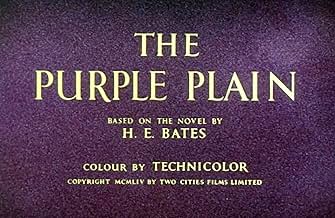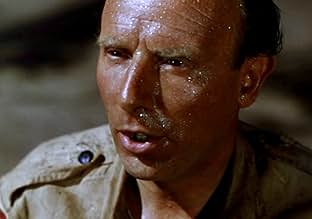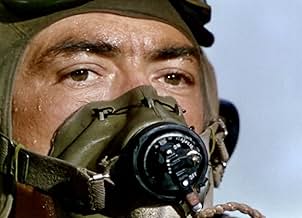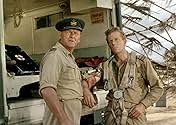IMDb रेटिंग
6.5/10
2.6 हज़ार
आपकी रेटिंग
अपनी भाषा में प्लॉट जोड़ेंIn World War II Burma, a Canadian bomber pilot becomes reckless after losing his bride in a Luftwaffe air raid.In World War II Burma, a Canadian bomber pilot becomes reckless after losing his bride in a Luftwaffe air raid.In World War II Burma, a Canadian bomber pilot becomes reckless after losing his bride in a Luftwaffe air raid.
- 4 BAFTA अवार्ड के लिए नामांकित
- 4 कुल नामांकन
Brenda de Banzie
- Miss McNab
- (as Brenda De Banzie)
Dorothy Alison
- Nurse
- (बिना क्रेडिट के)
Peter Arne
- Flight Lieutenant
- (बिना क्रेडिट के)
Ernest Blyth
- Man Dancing at Wedding
- (बिना क्रेडिट के)
Richard Duke
- Nightclub Patron on Dance Floor
- (बिना क्रेडिट के)
Jack McNaughton
- Sgt. Ralph Brown
- (बिना क्रेडिट के)
Lane Meddick
- Radio Operator
- (बिना क्रेडिट के)
Harold Siddons
- Navigator Williams
- (बिना क्रेडिट के)
Mya Mya Spencer
- Dorothy
- (बिना क्रेडिट के)
फ़ीचर्ड समीक्षाएं
This well-produced and often-moving J. Arthur Rank production stars Gregory Peck as a Canadian flyer serving with the British in Burma, suicidally reckless after his wife's death in the Blitz, who finds new reason for living after meeting a beautiful Burmese girl. Then, however, his plane crashes in the wilderness behind Japanese lines and he has to find a way to get back home with his injured crewman and complaining passenger. It's beautifully shot, well-acted, and a powerful story of hope vs. Despair. Apparently, a popular hit in Britain, it doesn't seem to have made much of a mark in the U. S. but deserves to be much better known.
10ekeby
I've had this movie on my 10 Best List for many, many years.
This story of healing from loss through love is immensely powerful. It's exquisitely photographed; it looks much more art film than Hollywood. The direction is solid, and the pacing near perfect. Peck holds his own among a field of scene-stealing character actors. His performance gives us a clue as to what he was like on the stage. His good looks don't distract you; he's utterly convincing as a pilot who's lost the love of his life and no longer cares whether he lives or dies. In the first part of the movie his character is not a good guy, and it's believable. Hard to do when you look like Gregory Peck.
Love conquers all, of course. The story turns on his love for a woman. But, as the movie progresses, we find that he loves his crew too, even "old Blore." The young navigator worships him, and the admiration is returned full force. Their relationship is a key element of the story, as important as the romance between Peck and the Burmese girl.
This is one of those rare movies where men openly love each other--not in a gay sense--in a human sense. It's a love based on respect. This is something missing from almost all heterosexual movies. Probably because most men don't seem to be able to easily distinguish between sex, attraction, affection, and love. It all gets mixed up together, and homophobia damps down any positive emotions between men that isn't associated with some sport. Wartime seems to provoke these feelings too, evidently, but it's rare for a picture to show manly affection, except as a joke. It's just one aspect of this film, but one that shouldn't be overlooked.
I can only hope this movie gets rediscovered and recognized for the fine, fine film that it is.
This story of healing from loss through love is immensely powerful. It's exquisitely photographed; it looks much more art film than Hollywood. The direction is solid, and the pacing near perfect. Peck holds his own among a field of scene-stealing character actors. His performance gives us a clue as to what he was like on the stage. His good looks don't distract you; he's utterly convincing as a pilot who's lost the love of his life and no longer cares whether he lives or dies. In the first part of the movie his character is not a good guy, and it's believable. Hard to do when you look like Gregory Peck.
Love conquers all, of course. The story turns on his love for a woman. But, as the movie progresses, we find that he loves his crew too, even "old Blore." The young navigator worships him, and the admiration is returned full force. Their relationship is a key element of the story, as important as the romance between Peck and the Burmese girl.
This is one of those rare movies where men openly love each other--not in a gay sense--in a human sense. It's a love based on respect. This is something missing from almost all heterosexual movies. Probably because most men don't seem to be able to easily distinguish between sex, attraction, affection, and love. It all gets mixed up together, and homophobia damps down any positive emotions between men that isn't associated with some sport. Wartime seems to provoke these feelings too, evidently, but it's rare for a picture to show manly affection, except as a joke. It's just one aspect of this film, but one that shouldn't be overlooked.
I can only hope this movie gets rediscovered and recognized for the fine, fine film that it is.
A pot-boiler of a Film that is intelligently crafted by Director Robert Parrish. To some it may seem intolerably slow & lacking pace, but to others like myself the Film does something that nearly all Films in the Fifties and indeed many now do not even attempt to achieve, and that is take the time to investigate the main characters in depth and in detail. This is done not via long tracts of dialogue, but via the un-said. In particular Peck and the astonishingly beautiful and talented Win Man Than as 'Anna' develop their relationship in the Film in the subtlest and most delicate of manners. I can find no further information on Win Man Tan, but her performance in this period piece, is one part enchanting, one part mesmerising. We understand fully how Peck's psychiatric problems eventually dissolve as hie begins to find perspective courtesy of love for 'Anna'. This Film is not staggering nor the best piece of Cinema you will ever see, but it is superbly acted, wonderfully cast, sparingly written, adroitly directed, and deserves to be watched by anyone who has a love of Cinema. Recommended, because what we see at our Cinemas today has MUCH to learn from Movie making such as this.
In The Purple Plain Gregory Peck became the latest in a long list of American stars playing Canadians in order to appear natural in a British production. At least Peck did not attempt an English accent as he did in The Paradine Case where he drifted in and out of one during the course of the film.
The Purple Plain is set in the China-Burma-India Theater of World War II and Peck is a pilot with the RAF. He's a man who takes reckless chances on missions because he's got nothing to live for, his wife having been killed in the blitz in wartime London.
But a doctor friend, Bernard Lee, decides what Peck needs is a new woman and a new purpose in life. He introduces him to missionary Brenda DaBanzie and also to a lovely Eurasian played by Win Min Than in her one and only film. If The Purple Plain has a glaring weakness it's her, she's beautiful, but can't act.
Peck may have a new outlook on life and a reason to live, but that fact is lost on Maurice Denham his bunkmate and copilot. On a routine mission, Peck, Denham, with new navigator Lyndon Brook crash in the Burmese jungle. Will they all survive as Peck's leadership is put to the test?
If the jungle looks familiar, The Purple Plain was shot in Sri Lanka, Ceylon at the time which was for a brief period, a most popular place for film locations. Around the same time Elephant Walk was done here and later on the acclaimed Bridge on the River Kwai. The Purple Plain is beautifully photographed in that jungle.
The Purple Plain is not as good as The Bridge on the River Kwai, it certainly is much better than Elephant Walk. Peck delivers a stalwart performance and gets able assistance from the rest of the cast with the exception of his leading lady. It's worth a look the next time it is broadcast.
The Purple Plain is set in the China-Burma-India Theater of World War II and Peck is a pilot with the RAF. He's a man who takes reckless chances on missions because he's got nothing to live for, his wife having been killed in the blitz in wartime London.
But a doctor friend, Bernard Lee, decides what Peck needs is a new woman and a new purpose in life. He introduces him to missionary Brenda DaBanzie and also to a lovely Eurasian played by Win Min Than in her one and only film. If The Purple Plain has a glaring weakness it's her, she's beautiful, but can't act.
Peck may have a new outlook on life and a reason to live, but that fact is lost on Maurice Denham his bunkmate and copilot. On a routine mission, Peck, Denham, with new navigator Lyndon Brook crash in the Burmese jungle. Will they all survive as Peck's leadership is put to the test?
If the jungle looks familiar, The Purple Plain was shot in Sri Lanka, Ceylon at the time which was for a brief period, a most popular place for film locations. Around the same time Elephant Walk was done here and later on the acclaimed Bridge on the River Kwai. The Purple Plain is beautifully photographed in that jungle.
The Purple Plain is not as good as The Bridge on the River Kwai, it certainly is much better than Elephant Walk. Peck delivers a stalwart performance and gets able assistance from the rest of the cast with the exception of his leading lady. It's worth a look the next time it is broadcast.
A really fine film and quite remarkable especially for it's time; shot on location (Ceylon standing in for Burma) in color and with an actual Burmese woman for the female romantic lead. As a war film the pacing and lack of any real 'battle scenes' might disappoint a few people. But the film is at its core is a character study of a RAF pilot (Peck) who has 'gone round the bend' suffering from what we'd call PTSD today and how his battle with it consumes him as much as the war with the Japanese.
The other major character - other that the wonderful Win Min Than as the 'love interest' - is the location itself. 'Location as Charter' is something that David Lean latter became famous for but here in this film the immense expanse of jungle and plain becomes a beautiful but deadly antagonist The 'actual enemy', the Japanese Army, is tellingly, never seen.
As this is a British film all the performances (except for -shockingly- the one Scotswoman in the film) are nicely understated. At one point Peck's character admits that he has been trying to get himself killed in battle ever since the death of his wife to which he drolly adds ' you think that would be pretty easy in a war....but all they kept doing was giving me medals....' WWII airplane geeks ( guilty as charged) will appreciate the shots of the De Haviland Mosquitoes in operation.
The other major character - other that the wonderful Win Min Than as the 'love interest' - is the location itself. 'Location as Charter' is something that David Lean latter became famous for but here in this film the immense expanse of jungle and plain becomes a beautiful but deadly antagonist The 'actual enemy', the Japanese Army, is tellingly, never seen.
As this is a British film all the performances (except for -shockingly- the one Scotswoman in the film) are nicely understated. At one point Peck's character admits that he has been trying to get himself killed in battle ever since the death of his wife to which he drolly adds ' you think that would be pretty easy in a war....but all they kept doing was giving me medals....' WWII airplane geeks ( guilty as charged) will appreciate the shots of the De Haviland Mosquitoes in operation.
क्या आपको पता है
- ट्रिवियाWin Min Than's husband was so jealous about losing her to the film's "decadent" Hollywood star Gregory Peck, he ordered his wife to eat garlic before romantic scenes with Peck. Fortunately, the production crew was able to convince her husband that Peck and the others were respectful of her so he went home leaving her to finish the picture in peace.
- गूफ़When Peck's co-pilot looks out at the starboard engine, it is leaking some kind of fluid, but that fluid is running down the side of the engine. It's not showing any sign of what would have to be, at least a 200 mph wind, passing over the nacelle.
- भाव
Anna: It's not good to die inside.
Squadron Leader Bill Forrester: It's like living a bad dream.
Anna: Here we bury the dead in the earth not in our hearts. Is the dream over now?
Squadron Leader Bill Forrester: I think so.
- क्रेज़ी क्रेडिटOpening credits prologue: BURMA 1945
- कनेक्शनReferenced in Toon in with Me: On This Day... June 25th (2024)
टॉप पसंद
रेटिंग देने के लिए साइन-इन करें और वैयक्तिकृत सुझावों के लिए वॉचलिस्ट करें
- How long is The Purple Plain?Alexa द्वारा संचालित
विवरण
बॉक्स ऑफ़िस
- बजट
- $20,00,000(अनुमानित)
- चलने की अवधि1 घंटा 37 मिनट
- रंग
- पक्ष अनुपात
- 1.66 : 1
इस पेज में योगदान दें
किसी बदलाव का सुझाव दें या अनुपलब्ध कॉन्टेंट जोड़ें































